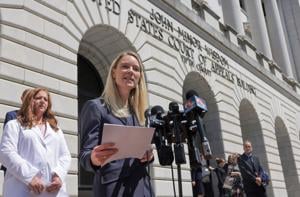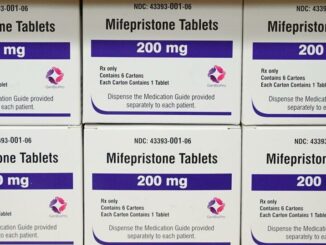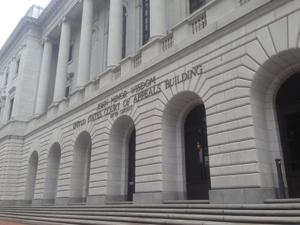
A federal appeals court panel in New Orleans took aim Wednesday at the U.S. Food and Drug Administration over its move in 2016 to expand access to a widely used abortion drug, as three conservative judges weighed its legal status in the post-Roe v. Wade era.
Much of Wednesday’s hearing at the U.S. Fifth Circuit Court of Appeals focused on whether a group of anti-abortion doctors has legal standing to challenge the FDA’s approval in 2000 and subsequent expanded access for mifepristone, one of two drugs used commonly in chemical abortions.
But the three judges, each of whom has favored abortion opponents in the past, also probed the drug’s approval process, and whether the FDA did enough to study safety issues in allowing, among other things, for the drug to be prescribed by non-doctors and sent through the mail.
All three judges questioned the regulatory basis for the drug’s approval and expanded access, while steering clear of a national debate over abortion itself, following the U.S. Supreme Court’s ruling last June removing a constitutional right to the procedure.
A group of anti-abortion doctors called the Alliance for Hippocratic Medicine challenged the FDA’s approval of the drug two decades ago, and several agency steps in 2016 that expanded access to it. Among them were measures allowing the drug to be sent through the mail and able to be prescribed by non-doctors.
“You’ve made it much more likely patients are going to need emergency care,” Judge Cory T. Wilson said of the changes.
“My whole point is the status has changed dramatically,” added Judge James C. Ho of Texas, who like Wilson was nominated to the bench by former President Donald Trump.
The panel was hearing an appeal to a ruling by a Texas jurist, Matthew J. Kacsmaryk, also a Trump nominee, who said approval of the drug should be overturned.
The U.S. Supreme Court temporarily blocked Kacsmaryk’s ruling last month, as conflicting rulings by federal judges in different circuits seemed to presage an eventual fight before the high court over the drug’s future.
In her oral argument, FDA attorney Sarah Harrington described the legal challenge to the agency’s authority as an “unprecedented and unjustified attack” on the federal agency.
“It’s not the court’s role to come in and second-guess the experts,” she said.
Harrington argued that Kacsmaryk’s ruling relied on “speculative downstream effects,” and that the anti-abortion doctors couldn’t claim they were at risk of harm from the changes, and so had no standing.
Judge Jennifer Walker Elrod, a nominee of President George W. Bush, highlighted statements from the anti-abortion doctors, however, who claimed they were forced to care for patients after the abortion drugs didn’t work. Fewer safeguards meant “that they will just do it more often,” Elrod said.
Erin Hawley, an attorney for the alliance, claimed the plaintiff doctors have been harmed already.
“They allege that they feel complicit in an elective abortion by being forced to complete that procedure,” Hawley argued.
Elrod, meanwhile, chided lawyers for the FDA and Danco Laboratories, which makes the drug, for what she considered an untoward attack on Kacsmaryk, the Texas judge. Danco described his ruling in legal filings as an “unprecedented judicial assault.”
Danco attorney Jessica Ellsworth defended the language, saying it “reflects our view the district court was very out of bounds.”
Ellsworth argued that Danco faced “existential” damage from the legal challenge. At the least, she said, a ruling against the FDA would remove the drug “from lawful distribution for a number of months.”
Ho pointed to another recent instance in which the FDA withdrew a drug’s approval, arguing against the idea that stanching access to mifepristone would be unprecedented.
“We are allowed to review the FDA just like we review any agency,” he said.
Jody Madeira, a law professor at Indiana University, called the arguments made by the doctors’ group “quite frankly, baloney.”
Madeira described the drug as “one of the safest drugs out there and one of the most consistent out there.” She said she doubted the FDA would enforce a court-imposed ruling against the drug.
“I think the ruling will be meaningless,” she said.
“I also think the Supreme Court is going to see the implications for the international pharmaceutical industry,” Madeira added. “If one judge can just stop approval of a drug that’s efficacious, no known side effects, with a stellar track record of success, what drug is safe?”



Leave a Reply